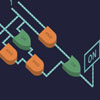IT Info
Understand Trend
EPFL Computing Lab Researchers Invent Near-Zero-Cost Alternative to Bitcoin

Researchers at EPFL (Ecole Polytechnique Fédérale de Lausanne) Switzerland have developed a system that could represent a shift in cryptocurrency paradigm.
The system was developed in Professor Rachid Guerraoui Distributed Computing Lab (DCL). The team which includes Professor Guerraoui, announced that the new system is a near zero-energy alternative to Bitcoin and will change how we think about cryptocurrencies.
Traditionally, Bitcoin model which was first described in 2008 by Satoshi Nakamoto, relies on a “consensus” by actors on the network, to validate transactions and guarantee security. Achieving consensus for cryptocurrency transactions is not as easy as it sounds. Players or actors (mostly known as miners) must solve/execute complex, and energy-intensive computing tasks that are further verified by other players (Proof-of-Work).
As transactions increased, Bitcoin became not just a processor killing system but also an energy gulper. It has been reported that Bitcoin alone has a global electricity consumption approaching that of Austria, and a global carbon footprint comparable to that of Denmark.
How the Flip of Concept Solved the Cryptocurrency Problem
In the new system, Guerraoui and his colleagues flip the assumption that all players are potential cheaters on its head, to using a legal metaphor: all players in this new system are innocent until proven guilty.
“We take a minimalist approach. We realize that players don't need to reach consensus; they just need to prevent malicious behavior when it manifests,” Guerraoui explains. “So, we assume everyone is honest, and if players see someone trying to do something wrong, they ignore that player—and only that player.”
The new system which is also called Byzantine Reliable Broadcast will not require the traditional consensus but can achieve safe cryptocurrency transactions on a large scale. Hence, it promises an energy cost of virtually zero—“roughly equivalent to that of exchanging emails,” said Guerraoui, and just a few grams of CO2 compared to an estimated 300 kg for a single Bitcoin transaction.
Communication Plays a Major Role in Securing the New System
According to the team, the central element of communicating, or broadcasting information is what gives the Byzantine Reliable Broadcast system its name. Players or users just need to communicate with each other, to be sure that cryptocurrency transactions are secure, since they can’t tell who the malicious players are.
Guerraoui explains further, “If a malicious player wants to make a payment, for example, this system would not allow anyone to accept money from that player until a randomly chosen sample has confirmed the player has not sent money to anyone else; otherwise, the payment will not be accepted.”
After first publishing the theoretical results behind the system earlier this year in the proceedings of the 2019 ACM Symposium on Principles of Distributed Computing (ACM PODC) held in Canada, Guerraoui and his colleagues have recently published a second paper describing the implementation and scale-up of their algorithm.
As announced, the second DCL paper has already garnered interest from industry, and won the Best Paper Award at the DISC 2019 conference (the 33rd International Symposium on Distributed Computing). The award will be presented in Budapest, Hungary in few weeks.










